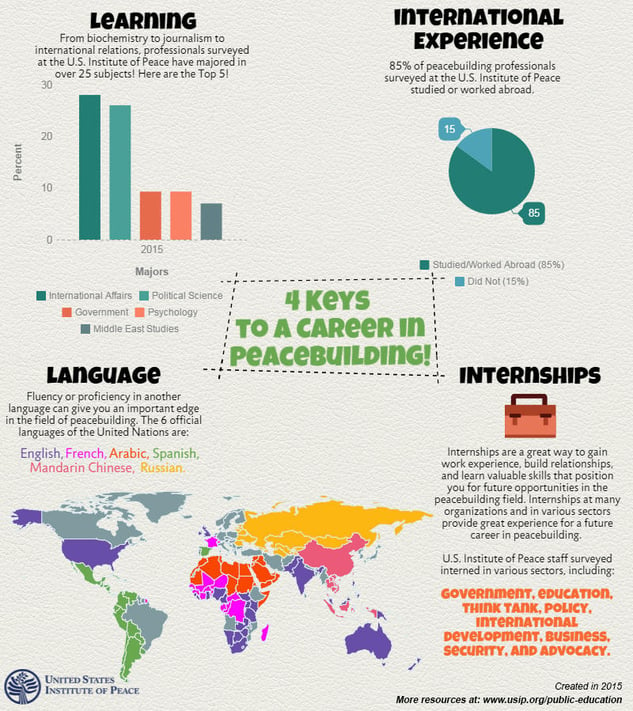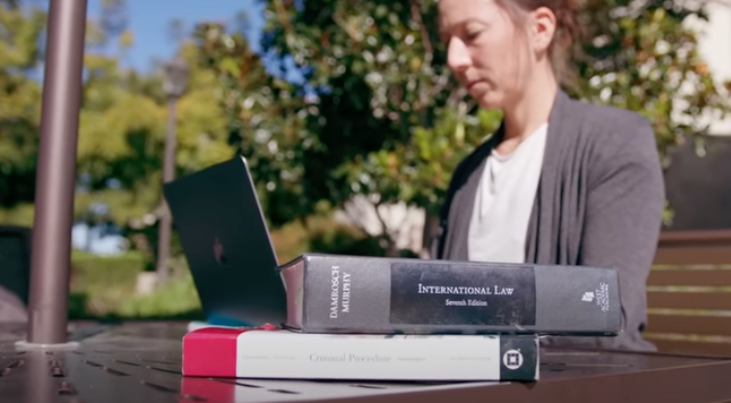Peace studies focuses on the prevention, management and resolution of conflicts, as well as the promotion of peace and social justice. As the world continues to face complex challenges, the need for individuals who are trained in peace studies has never been more important. Explore the world of peace studies and a few of the careers available in this field.
What Is Peace Studies?
Peace studies is an interdisciplinary field that draws from various social sciences, including sociology, political science, economics and anthropology. The field emerged in the 1950s as a response to the devastating effects of World War II and the growing threat of nuclear war. Today, peace studies is more relevant than ever as the world faces an array of complex problems, including climate change, poverty and social inequality.
Careers in Peace Studies
According to a recent study by the Institute for Economics and Peace, there are over 1.9 million peace-related jobs worldwide. These jobs can be found in a variety of fields, including government, non-governmental organizations (NGOs) and private companies. Below are just a few examples of career opportunities in peace studies.
Conflict Resolution Specialist
Conflict resolution specialists work to prevent and resolve conflicts at all levels of society, from interpersonal disputes to large-scale international conflicts. They may work for NGOs, international organizations or government agencies.
Policy Analyst
A policy analyst works to develop and evaluate policies related to issues such as human rights, conflict resolution and peacebuilding. They may work for non-profit organizations, government agencies or private companies.
International Development Worker
International development workers focus on promoting and improving social and economic development in communities and countries around the world. They often work for non-profit organizations, government agencies or international organizations, and may be involved in a wide range of areas such as poverty reduction, health care, education and environmental sustainability.
Conflict Mediator
Mediators work to facilitate communication and negotiation between parties in conflict. They may work in a variety of settings, including schools, workplaces, government agencies and community organizations.
Peace Educator
Peace educators may work as a professor, teacher or trainer, providing education and skills to students and professionals interested in peace and justice-related careers. They may work for schools and universities, non-profit organizations or private companies.
Restorative Justice Practitioner
A restorative justice practitioner works to promote healing and repair relationships between individuals and communities affected by crime or harm. They may work for non-profit organizations or government agencies and may be involved in areas such as victim-offender mediation, conflict resolution and community building.
International Human Rights Lawyer
An international human rights lawyer works to promote and protect human rights around the world, often through legal advocacy and litigation. They may work for non-profit organizations, government agencies or private companies, and may be involved in areas such as civil liberties, refugee rights and international criminal law.
Environmental Justice Specialist
An environmental justice specialist works to address environmental and climate-related issues in ways that promote social and environmental justice. They may work for non-profit organizations or government agencies and may be involved in issues such as climate change, energy policy and pollution reduction.

United States Institute of Peace 4 Keys to a Career in Peacebuilding Infographic
Earning Your Peace Degree at Kroc School
There are a lot of factors to consider when choosing to earn a peace studies degree and the best school and program for you – type of school, length of program, modality options, cost – but most importantly, deciphering which graduate program is best for you based on your individual interests.
At the Joan B. Kroc School for Peace Studies, we offer different graduate degree options that all have one thing in common: building peacemakers. Maybe you’ve decided you want to help create more peaceful communities and become an International Development Worker, or you want to promote peace education as an Educator. Whatever your future holds, we have the resources, ideas, faculty, research and most importantly, we have the passion to help you begin this journey.
Pursuing a degree in peace studies at the Kroc School can be beneficial in many ways, including:
- Developing critical thinking, learning problem-solving skills and working with real-life, hand-on experiences
- Gaining a deeper understanding of global issues and social justice with world-renown faculty
- Acquiring skills and knowledge that are highly valued by employers in a variety of fields
- Building a network of like-minded individuals who are committed to peace and justice
Making a difference in our communities and in the world doesn’t happen overnight, but with the proper skills and education, you can place yourself one step closer to fulfilling your passion for change.
At the Kroc School of Peace Studies, we offer a range of programs in peace studies.
Discover what kind of peacebuilder you are!
Questions? Feel free to schedule a one-on-one virtual meeting with an admissions advisor today!

About the Author
The Joan B. Kroc School of Peace Studies (Kroc School) at the University of San Diego is the global hub for peacebuilding and social innovation. Founded in 2007, the Kroc School equips the next generation of innovative changemakers to shape more peaceful and just societies. We offer master's degrees in peace and justice, social innovation, humanitarian action, conflict management and resolution, and a dual degree in peace and law — programs that have attracted diverse and dynamic students from more than 50 countries. In addition to our graduate programs, the Kroc School is home to the Kroc Institute for Peace and Justice (Kroc IPJ). Founded in 2001, the Institute supports positive change beyond the classroom. Through groundbreaking research, experiential learning, and forward-thinking programs, the Kroc School and Kroc IPJ are shaping a future in which peaceful co-existence is the new normal.









